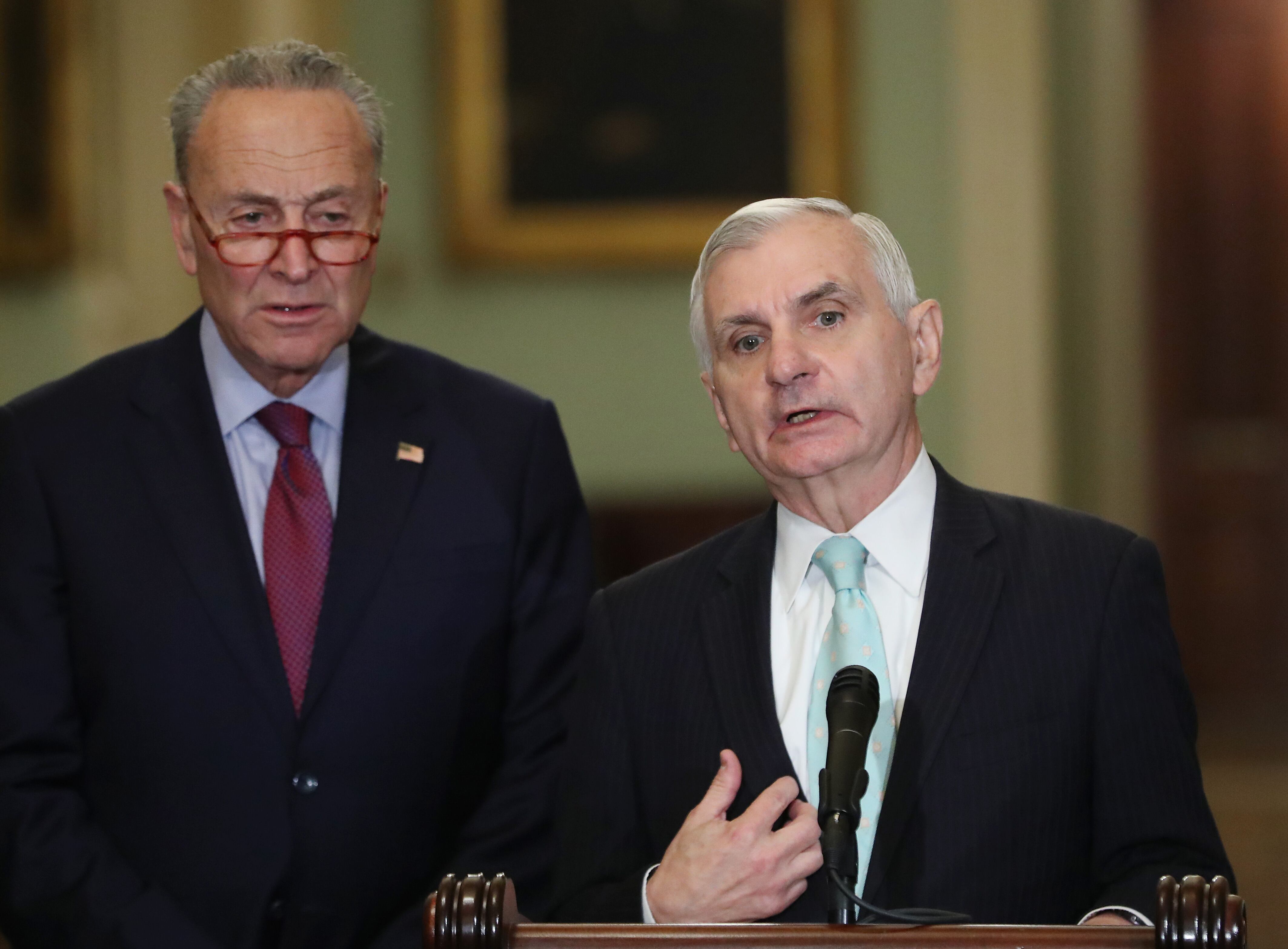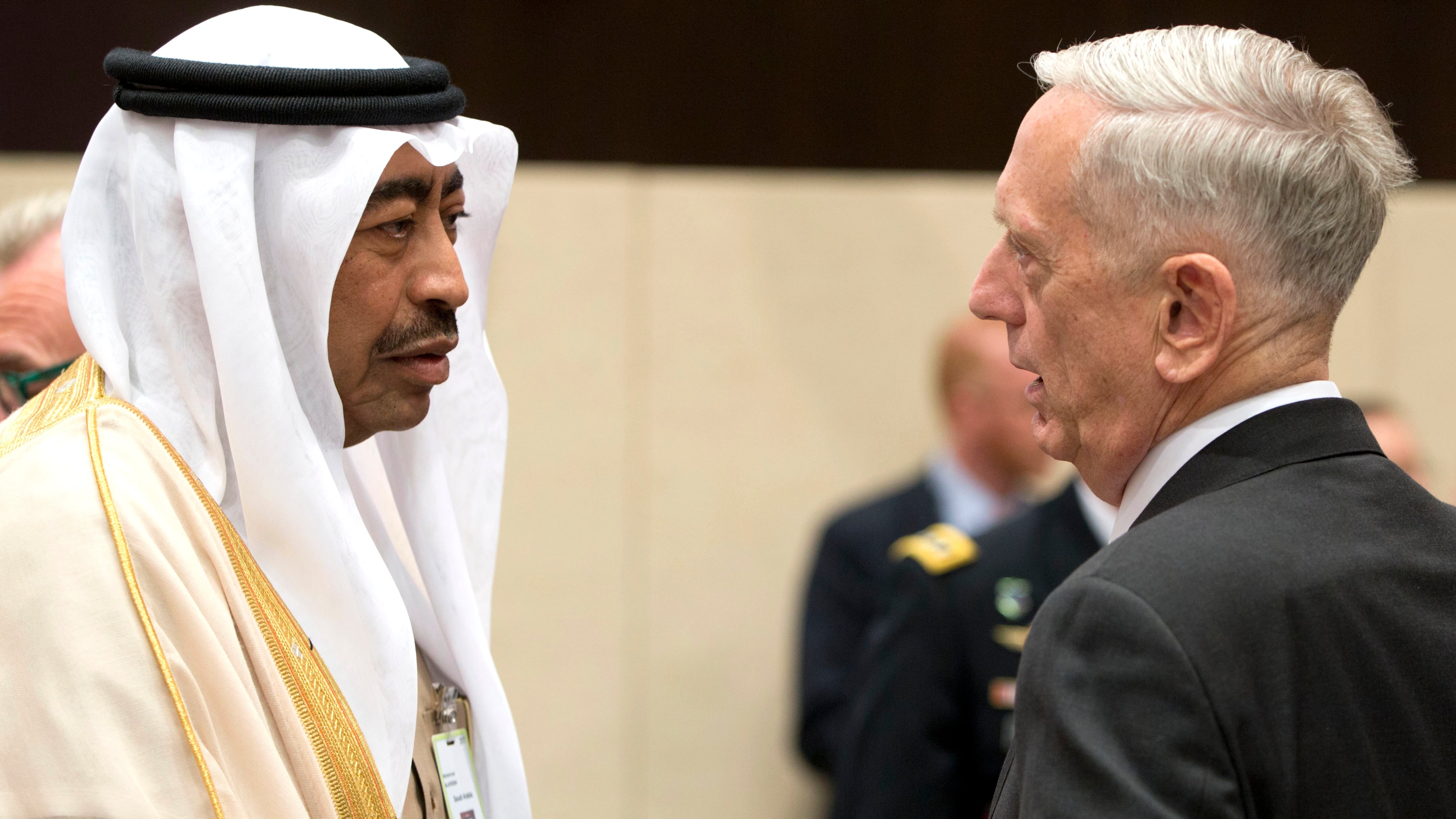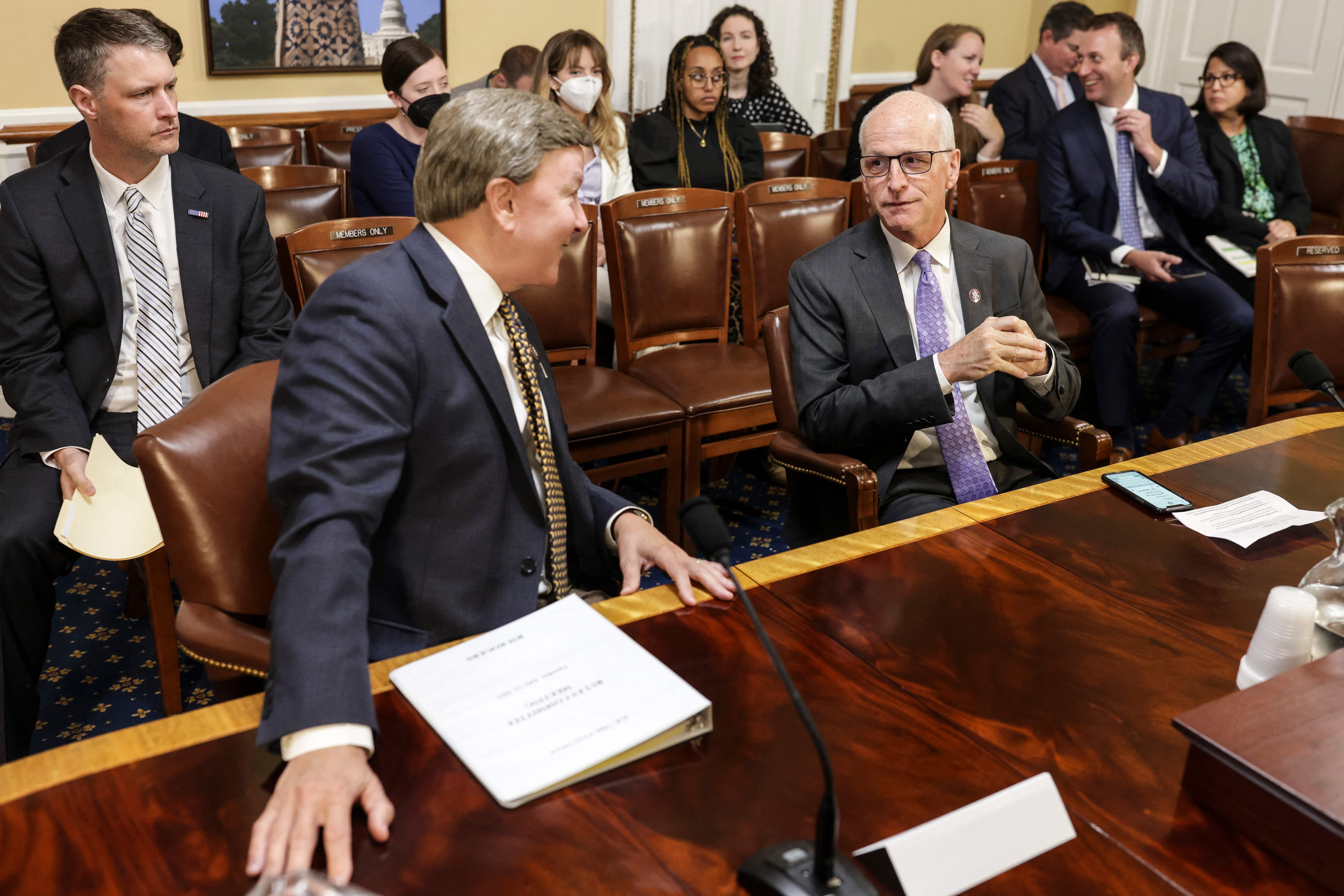WASHINGTON ― Rhode Island Democratic Sen. Jack Reed is known to talk softly. But if Democrats retake the Senate, he could carry a megaphone as chairman of the Senate Armed Services Committee.
A deferential, bipartisan and respected ranking member for the last six years opposite Republican chairmen John McCain and Jim Inhofe, Reed has never stepped into such an agenda-setting and high-profile role in his decades-long legislative career. Despite credentials as an Army Ranger, paratrooper, and graduate of West Point and Harvard Law School, he’s shown little interest in raising his profile outside Washington and Rhode Island.
The spry 70-year-old tends to zip past reporters in the Senate, and when he does stop, they sometimes strain to hear him. He appears on national television rarely. He twice stepped out of the running for defense secretary under President Barack Obama, opting to continue his quieter Senate career.
Now, with Democrats fighting to retake the chamber (and the White House) in the Nov. 3 elections, Reed could move into one of Congress' most visible positions and is favored to be a major defense figure for his party.
Though Reed’s priorities as the potential chairman remain unclear, insiders credit him as a careful listener whose style emulates his mentor on the panel, Michigan Democratic Sen. Carl Levin, a longtime SASC chairman who was tough on issues such as Guantanamo detainees and military sexual assault.
Reed’s office declined to comment for this article.
Reed ― who’s evinced conventional, consensus-oriented foreign policy views ― would be a central player amid the split between former Vice President Joe Biden (if he wins) and progressives who are skeptical of military intervention and mammoth defense budgets.
“I think there are issues where Jack Reed might be a little bit of a foil to some of the Progressive orthodoxy that’s going on in the Democratic Party right now, because if he’s not a centrist, he holds mainstream national security views that aren’t necessarily aligned with folks who want to cut the defense budget by 10 percent across the board,” said a Senate Armed Services Committee staffer.
Reed, the staffer said, fits with what Ben Rhodes, an adviser to President Barack Obama, called “the Blob,” meaning the foreign-policy establishment Rhodes and Obama saw themselves challenging.
This summer, Vermont Sen. Bernie Sanders, a Democratic socialist who has led the left’s argument to tap the Pentagon’s bloated budget for domestic needs, sponsored an ultimately defeated an amendment to reduce the $740.5 billion defense authorization bill by a 10 percent. That effort won the support Senate Minority Leader Chuck Schumer, D-N.Y., and Senate Minority Whip Richard Durbin, D-Ill.
Reed argued against a sweeping and indiscriminate cut and voted “no.”
“Our strength is not just military forces, our strength is knowledgeable citizens, our strength is healthy citizens, our strength is an efficient and economic system,” Reed said in floor speech. “But I think ... this across-the-board approach, it’s good for a headline, it’s good to make a point, but we’re here to make policy.”

A Biden agenda
After record budget increases under Trump, and in the midst of pandemic, progressives have agitated for reprioritized spending in favor of healthcare, education and jobs. Calling for pragmatism, House Armed Services Committee Chairman Adam Smith, D-Wash., has predicted an internal “fight” over defense spending will yield a flat budget ― and Reed has more or less concurred.
“I think President Biden will send a budget up that recognizes essentially the same reality that President Trump would have to recognize, which is that the increases of the last several years are not going to be carried forward, that we’re in more of a steady-state, sort of flat-line budget, and within that budget we’re going to have to make savings,” Reed said at an online summit hosted by the Association of Defense Communities.
“I don’t think a President Biden would ask for dramatic cuts. So the question is rallying support among all of our Democratic colleagues for President Biden’s budget,” Reed said. He added that Republican opposition on deficit spending toward COVID relief is a part of the bipartisan headwinds facing defense spending.
SASC’s jurisdiction covers an extraordinary range of military issues, but the chairman’s primary responsibility is shepherding the annual National Defense Authorization Act, the last dependable legislative vehicle left in Congress. McCain used the gavel to pass reforms that reshaped the Pentagon’s acquisitions hierarchy, while Inhofe sought and won defense topline increases in the name of the Trump administration’s National Defense Strategy and remedying years of statutory budget caps.
The top Republican and Democrat of each chamber’s armed services committee, who are collectively known as the “big four,” conduct the end-stage negotiations over the NDAA. The process is often difficult but historically driven by a bipartisan drive to finish the bill, and while Reed’s expected to continue to stick that tradition, Democrats would hold more sway under a unified government.
In addition, Armed Services would be a key committee under Biden, whose foreign policy priorities include rebuilding America’s alliances abroad, in part to push back against Beijing. Biden has said he doesn’t foresee major reductions in the U.S. military’s budget as it reorients from Iraq and Afghanistan to potential threats from “near-peer” powers.
And Reed tends to go where his party and its leaders go. In bipartisan spending negotiations, he echoes the party’s position that national security spending should include defense, but also the Department of Homeland Security, State Department and Centers for Disease Control and Prevention.
While progressives and others believe the United States has spent too much time, money and blood on battlefields far from home, and Trump has said he would end “endless wars,” Reed in recent months has sided with bipartisan efforts to oppose Trump’s “precipitous withdrawal” from Afghanistan and the Middle East. Along similar lines, Biden has said some troops could stay in Afghanistan to focus on the counterterrorism mission.
Though Reed’s support for modernizing the nuclear triad also contrasts with more progressive lawmakers, he backed a failed Democratic effort to bar the Trump administration from developing a low-yield, submarine launched nuclear weapon, and he opposes a restart of nuclear testing.
In addition, Reed initially voted against extracting the U.S. military from the Yemen civil war, which placed him in the minority in his own party, but voted in favor of later efforts. He co-sponsored related legislation with Sen. Lindsey Graham, R-S.C., and several top Democrats, to block Trump’s $8.1 billion arms sale to Saudi Arabia ― and he complained when likeminded provisions were left out of the 2020 NDAA. (Biden wants to reevaluate US-Saudi ties.)
“I strongly support a prohibition on U.S. arms transfers, and other offensive support to the Saudi led coalition and will continue working to stop the bloodshed and suffering in Yemen,” Reed said in a December 2019 floor speech, adding that the instability caused by the war was a gift to Iran and the Islamic State.
RELATED

China and sea power
Of late, Reed has supported efforts to counter China along economic and diplomatic lines, joining a bipartisan bill to boost investments in U.S. chipmakers. On the military side, Reed joined Inhofe to back the $6 billion, multiyear Indo-Pacific Deterrence Initiative which would counter China with investments in new missile defense as well as infrastructure in the region: airfields, ports and depots for fuel and munitions.
The intent of the fund, Reed said, is to make U.S. forces in the region more lethal against Chinese weapons and techniques, strengthen alliances and partnerships and boost experimentation and international exercises focused on the region.
“I think this will operate as a deterrent as much as anything. If we can prove that we can disrupt any type of significant military operation by the Chinese, there’s less likely to take it,” Reed said, adding that unmanned capabilities, especially those operating undersea, could be used to penetrate China’s defensive bubble.
Calling Defense Secretary Mark Esper’s proposal for a 500-ship Navy “ambitious, frankly,” Reed nonetheless said Congress should consider its goals of expanding the submarine fleet, reducing aircraft carriers in favor of smaller auxiliary carriers capable of hosting the F-35B.

Reed has maintained a special focus on the Navy’s acquisition of the multi-purpose Virginia-class submarine, which is made at the General Dynamics Electric Boat’s Quonset Point, R.I., facility. He supported a two-per-year production rate as a cost saving measure and opposed the Navy’s decision not to seek a 10th Block V submarine for 2021.
Reed hailed the Navy’s largest-ever $22.2 billion, nine-submarine contract award late last year to General Dynamics and Huntington Ingalls Industries, Inc., of Newport News, Va., both for saving taxpayers 6.8 percent of the cost and as an economic boon to the Ocean State.
A top issue for the Pentagon is the military’s desire to adopt new technologies such as hypersonic missiles, autonomous vehicles and artificial intelligence, and divest from big systems that may have Capitol Hill buy-in but make less sense for great power competition. Those moves come with an eye on China’s continued rise as a superpower and potential U.S. military rival.
On this subject, Biden has said the military desperately needs to innovate in emerging technology. Reed could be a lynchpin in making that goal a reality.
Some see a tension between the left’s defense budget animus and this China-driven modernization push. Bill Greenwalt, of the conservative American Enterprise Institute and a former Senate Armed Services Committee staffer under McCain, questioned whether Democrats will accommodate the Pentagon when it seeks flexible spending authorities or whether they will demonstrate understanding should forward-leaning programs fail.
“Progressives are going to say this is wasteful, we only need one linear path to get somewhere, and it’s got to be predictive. But that’s not how we’re going to compete against China,” Greenwalt said, adding, "It’s going to be interesting whether [Reed and Smith] can actually say ‘no’ because the things progressives want will undermine the whole competition with China.”
But both Reed and Smith have suggested that the Pentagon can outpace its adversaries for less, if the Defense Department and its suppliers are pressed to be more efficient.
“We have some very principled and very thoughtful members [among] Senate Democrats who feel that there should be a reallocation," Reed said. “I think everyone recognizes that DoD can be much more efficient, that we have to start making really tough decisions about which legacy systems get carried on, about how we do modernization and how we jump over our peer competitors in terms of technology, not just sort of keep up with them.”
Joe Gould was the senior Pentagon reporter for Defense News, covering the intersection of national security policy, politics and the defense industry. He had previously served as Congress reporter.





